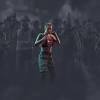Joan Didion, American journalist and author, dies at age 87

The unsparing observer of US culture, politics and public life won huge acclaim for her memoir The Year of Magical Thinking
Read Alex Clark’s interview with Joan Didion from February 2021
Obituary: Joan Didion

Joan Didion, the eminent journalist, author and anthropologist of contemporary American politics and culture – a singularly clear, precise voice across a multitude of subjects for more than 60 years – has died at her home in Manhattan, New York. She was 87.
The cause of death was Parkinson’s disease, according to Paul Bogaards, an executive at Didion’s publisher Knopf.
Known for her pioneering blend of the personal and the political in her journalism and essays, Didion became a household name with her writing on US society.
As a standout female figure in the male-dominated “new journalism” movement alongside Tom Wolfe, Truman Capote and Gay Talese, Didion cast her precise, coolly detached eye over both American society and her own life in writing that was collected in books including Slouching Towards Bethlehem, her journey through the promise and dissolution of California’s 60s counterculture, and The White Album, which began in typically economic style, with: “We tell ourselves stories in order to live.”
“We have kind of evolved into a society where grieving is totally hidden. It doesn’t take place in our family. It takes place not at all,” she told the Associated Press in 2005 after publishing The Year of Magical Thinking, an account of losing her husband John Gregory Dunne.
Didion spent her later years in New York, but she was shaped by her native state of California, which she called “a hologram that dematerialises as I drive through it”.
“A place,” she once wrote, “belongs for ever to whoever claims it hardest, remembers it most obsessively, wrenches it from itself, shapes it, renders it, loves it so radically that he remakes it in his own image.”
Famous for her detached, sometimes elegiac tone, Didion returned to the themes of alienation and isolation throughout her career, whether she was exploring her own grief after the death of Dunne in the Pulitzer-finalist The Year of Magical Thinking, the emptiness of Hollywood life in the novel Play It As It Lays, or expats caught up in Central American politics in her novel A Book of Common Prayer.
She was highly protective of her work, never telling even close friends the subject of her writing until it was ready to publish. “Nobody writes better English prose than Joan Didion,” literary critic John Leonard wrote. “Try to rearrange one of her sentences, and you’ve realised that the sentence was inevitable, a hologram.”

On her most recent collection of selected essays, Let Me Tell You What I Mean, the Guardian’s reviewer wrote: “Didion has established a way of narration that focuses not so much on events as on subtexts, atmospheres and perceptions. She is usually present in her essays as a voice rather than a character, observer rather than participant – though the boundaries regularly blur.”
After her death was announced, tributes poured in from across the spectrum of politics and literature. California governor Gavin Newsom said Didion was “peerless in her capacity to write about life, loss, love and society – easily the best writer in California. Her ability to put the tapestry of California and the times into words made her a treasure for her generation and generations to come.”
Author Susan Orlean called Didion “my idol and inspiration”.
“Didion was one of the country’s most trenchant writers and astute observers,” Penguin Random House and its imprint Knopf said in a statement.
Shelley Wanger, Didion’s editor at Knopf since the early 90s, told the Guardian the author was masterful and fearless. “She always seemed able to hear and see what other journalists missed and her range was broad, from California, rock ’n’ roll, to US culture and politics, Central America to memoir. Her writing is timelessly original, prescient and unexpected.”
Born in Sacramento in 1934, Didion spent her early childhood out of school, with her father’s job in the Army Air Corps taking the family all over the country. Didion was a a “nervous” child with a tendency to headaches but began her path early, starting her first notebook when she was five.
In a 2003 interview with the Guardian, she recalled an incident when she was 10: while writing a story about a woman who killed herself by walking into the ocean, she “wanted to know what it would feel like, so I could describe it” and almost drowned on a California beach. She never told her parents. (“I think the adults were playing cards.”)
In 1956, after majoring in English literature at the University of California, Berkeley, she won Vogue’s writing contest aged 21, which led to a seven-year stint working at the magazine’s offices in New York. There she met Dunne – they would marry when she was 29 – and between New York and Los Angeles, she began to mix with many famous contemporaries who would become friends, colleagues and rivals: Sylvia Plath, Roman Polanski, Janis Joplin (who crashed a house party), Christopher Isherwood (who called her “Mrs Misery” in his diaries), Warren Beatty and Natalie Wood (who shared her clothes with Didion).
In 1963, her first book was published: the novel Run, River. In 1966, Didion and Dunne relocated to Los Angeles and adopted a baby girl, Quintana Roo, named after the Mexican state. Her first collection of essays, Slouching Towards Bethlehem, was published in 1968: with its title essay about Haight-Ashbury’s hippy community, the collection established Didion’s voice as exceptional. Reviewing it for the New York Times, Dan Wakefield called Didion “one of the least celebrated and most talented writers of my own generation”.
Didion followed it up with her novel about life in Hollywood, Play It As It Lays, which she later adapted into a screenplay with Dunne; the couple often worked together on screenplays, including the 1976 film A Star Is Born. A smattering of fiction would follow over the next two decades – A Book of Common Prayer (1977), Democracy (1984) and The Last Thing He Wanted (1996) – but non-fiction dominated.
Her second essay collection, The White Album (1979), contained her most famous line: “We tell ourselves stories in order to live.” In 1983, came Salvador, a book-length essay about a trip she took to El Salvador with Dunne; Miami (1987), about the city’s Cuban expat community; After Henry (1992), a collection dedicated to Didion’s editor Henry Robbins; and Political Fictions (2001), which spanned the elections of US presidents George HW Bush, Bill Clinton and George W Bush.
Over decades, the diminutive Didion built her own mythology; more than one interviewer noted her quietness and frail frame with surprise. Her elegant style and interest in fashion, fostered at Vogue, also saw her revered as a symbol of cool; at the age of 80, she became the face of French fashion house Céline.
From the 80s onwards, Didion focused on politics, coining the term “the permanent political class” to describe the fraternity of media, politicians and strategists that shape the self-image of the US. After Clinton’s impeachment, she wrote: “No one who ever passed through an American high school could have watched William Jefferson Clinton running for office in 1992 and failed to recognise the familiar predatory sexuality of the provincial adolescent.” Among Washington journalists, she wrote, “what ‘fairness’ has often come to mean is a scrupulous passivity, an agreement to cover the story not as it is occurring but as it is presented, which is to say as it is manufactured.”
When Dunne died of a heart attack in 2003, Didion began writing The Year of Magical Thinking, an exploration of her grief at his death while their daughter, Quintana, was severely ill in hospital. Unsparingly documenting Didion’s resulting strange habits, such as keeping Dunne’s shoes for when he “came back”, the book won her a Pulitzer prize. Months after it came out in 2005, Quintana died from acute pancreatitis, aged 39, which Didion would write about in her 2011 reflection on ageing and parenting, Blue Nights.
When she was presented with her National Medal of Arts and the National Humanities medal in 2012, Barack Obama told guests: “I’m surprised she hasn’t already gotten this award.”
In her later years, Didion wrote less. Her most recent project was as the subject of Joan Didion: The Center Will Not Hold, a 2018 Netflix documentary made by her nephew, Griffin Dunne. Her final book of original material, South and West, was a collection of her notes while travelling around Mississippi, Alabama and Louisiana in the 1970s. When it was released in 2017, it was marketed as a take on Donald Trump’s voter base. Talking to the Guardian, Didion said: “I suppose the crisis in American politics was behind everything I was thinking, whether or not I knew I was thinking it. These things have a way of creeping in. I think we are living through the scariest of times.”
- Joan Didion
- Biography books
- Fiction
- Autobiography and memoir
- Journalism books
- Essays
- Women
- news


 United States
United States Argentina
Argentina  Australia
Australia  Austria
Austria  Brazil
Brazil  Canada
Canada  Chile
Chile  Czechia
Czechia  France
France  Germany
Germany  Greece
Greece  Italy
Italy  Mexico
Mexico  New Zealand
New Zealand  Nigeria
Nigeria  Norway
Norway  Poland
Poland  Portugal
Portugal  Sweden
Sweden  Switzerland
Switzerland  United Kingdom
United Kingdom 
























